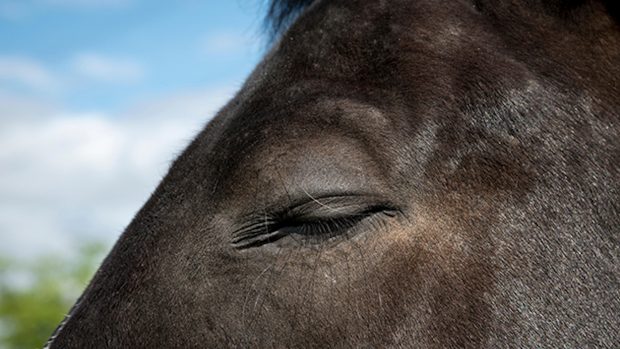Rider weight has been found to have a “substantial temporary effect” on horses’ movement and behaviour, initial findings of a landmark study have shown.
Researchers led by the Animal Health Trust’s (AHT) Dr Sue Dyson have “taken the first step towards tackling the issue of rider weight” in a pilot project.
Six horses and four riders took part in the study, which ran from 4-8 September.
The riders all rode “to a reasonable standard” but their weight was variously classed as light, moderate, heavy and very heavy.
“Each rider rode each horse, in a randomised order, and performed a standardised 30-minute exercise protocol that consisted mainly of trot and canter,” said an AHT spokesman, who added that the horses were ridden in their usual tack and that gait was monitored subjectively and objectively, taking into account behaviour, forces under saddle, alterations in back dimensions, as well as heart and respiratory rates and salivary cortisol levels.
“The aim of this stage of the study was to determine whether there were measurable differences in these outcomes among riders of different weights,” said the spokesman.
“All horses finished the study moving as well as when they started.
“Data analysis is ongoing but researchers can confirm there was a substantial temporary effect of rider weight as a proportion of horse weight (but not necessarily body mass index per se) on gait and behaviour.
“It appears that any adverse influence of less than ideally fitting tack was accentuated markedly by heavier riders. This study does not mean that heavy riders should not ride, but suggests that if they do they should ride a horse of appropriate size and fitness, with a saddle that is correctly fitted for both horse and rider.”
The researchers said they owed a “huge debt of gratitude” to the owners of the horses, and to World Horse Welfare, whose facilities were used.

Overweight riders asked to dismount at show
The organising committee ruled that anyone deemed to

Could your horse help save others from overweight riders?
The Animal Health Trust is looking for horses

Great Yorkshire Show asks ‘too heavy’ riders to dismount – again
The show was ‘disappointed’ 12 riders had to
The research came about after recent controversy over rider weight, which led to World Horse Welfare and the British Equestrian Federation setting up an initiative to raise funds for research into the issue.
“This study highlights the need for further research for which additional funding will be required,” said the AHT spokesman.
For all the latest news analysis, competition reports, interviews, features and much more, don’t miss Horse & Hound magazine, on sale every Thursday.




